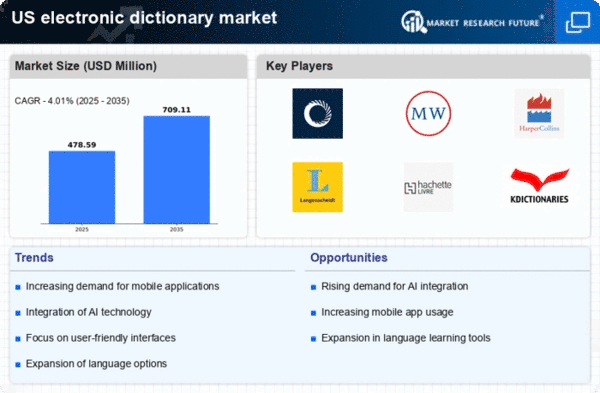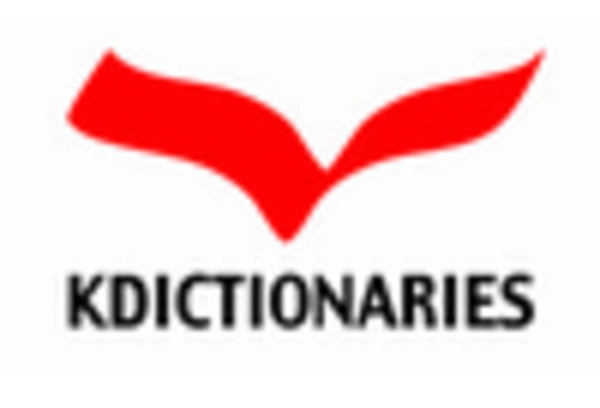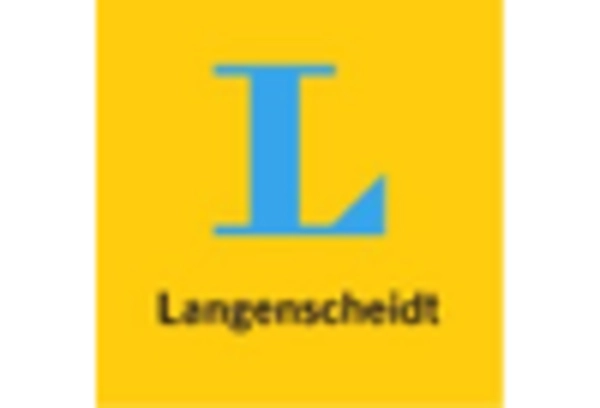Focus on User-Centric Design
The electronic dictionary market is increasingly characterized by a focus on user-centric design, which enhances usability and accessibility. As consumers become more discerning about their digital tools, manufacturers are prioritizing intuitive interfaces and customizable features. This shift is evident in the growing number of electronic dictionaries that offer personalized settings, such as adjustable font sizes and color themes. By 2025, it is anticipated that user-centric design will play a pivotal role in influencing purchasing decisions, with up to 40% of users indicating a preference for products that prioritize ease of use. The electronic dictionary market is thus adapting to these consumer preferences, ensuring that products meet the evolving needs of users.
Growth of E-Learning Platforms
The proliferation of e-learning platforms significantly influences the electronic dictionary market. As educational institutions and corporate training programs increasingly adopt online learning methodologies, the need for reliable language resources becomes paramount. In 2025, the e-learning market in the US is expected to reach approximately $375 billion, creating a substantial opportunity for electronic dictionaries to integrate with these platforms. The electronic dictionary market stands to gain from partnerships with e-learning providers, enhancing the accessibility and functionality of language tools for learners. This synergy not only broadens the user base but also reinforces the importance of electronic dictionaries in modern education.
Increased Smartphone Penetration
The widespread adoption of smartphones serves as a critical driver for the electronic dictionary market. With over 80% of the US population owning a smartphone as of 2025, the convenience of having language resources readily available on mobile devices cannot be overstated. This trend encourages developers to create user-friendly applications that cater to the needs of on-the-go learners. The electronic dictionary market is likely to see a shift towards mobile applications, which offer features such as offline access and voice search capabilities. As a result, the market is expected to expand, appealing to a broader audience seeking efficient language solutions.
Integration of Artificial Intelligence
The integration of artificial intelligence (AI) into electronic dictionaries represents a transformative driver for the electronic dictionary market. AI enhances user experience by providing personalized learning paths, contextual definitions, and voice recognition features. This technological advancement not only improves the accuracy of translations but also facilitates interactive learning. As of 2025, it is estimated that AI-driven features could account for up to 30% of the functionalities in leading electronic dictionaries. The electronic dictionary market is likely to see increased adoption rates as consumers become more aware of the benefits of AI, leading to a more engaging and efficient learning experience.
Rising Demand for Language Learning Tools
The electronic dictionary market experiences a notable surge in demand driven by the increasing interest in language learning among diverse demographics. As individuals seek to enhance their linguistic skills for personal, academic, or professional reasons, the market for electronic dictionaries expands. In 2025, the market is projected to grow at a CAGR of approximately 8.5%, reflecting the growing reliance on technology for educational purposes. This trend is particularly pronounced among students and professionals who require quick access to language resources. The electronic dictionary market is thus positioned to benefit from this rising demand, as users increasingly prefer digital solutions that offer portability and convenience.















